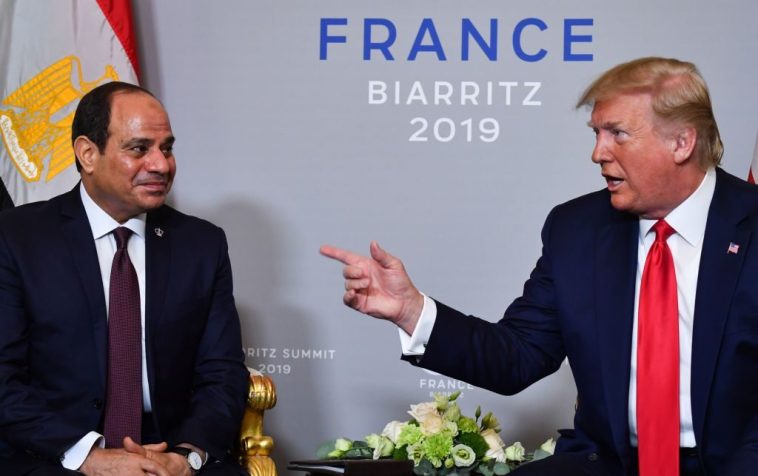There’s been a recent change in the international diplomacy scene with Egyptian President Abdel Fattah el-Sissi modifying his plans to meet with US President Donald Trump. Rumours are circulating about this decision, some opining it to be a response to President Trump’s innovative proposition for the Gaza issue. The President’s unique approach to global challenges is somewhat misunderstood among several Middle East leaders.
Just recently, President Trump articulated an innovative solution for the quagmire of Gaza. Manifesting a vision that many are finding challenging to comprehend, Trump proposed the transformation of Gaza, a strife-ridden region, into a vibrant ‘Riviera of the Middle East’. He suggested to reconstruct the torn-down sector and proposed to temporarily relocate its population to friendly neighborhoods like Egypt and Jordan.
Critics have jumped on this proposition expressing hesitation. For instance, Virginia Democrat Tim Kaine, a member of the Senate Foreign Relations Committee, engaged in conjecture regarding President Trump’s plans. Kaine argued that Egypt, based on its past inclinations, would not entertain this plan due to implications of absorbing relocated individuals from Gaza.
Further inciting rhetoric, Kaine suggested that this proposal of Trump had sparked fury in the Egyptian President. It must be remembered, however, this is simply one perspective. The boldness of the proposal has arguably led to a debate on its merits and drawbacks, a quintessential feature of democracy.
Jordanian King Abdullah II has also been reported to be showing unease. According to Kaine, the King has used diplomatic language to express discomfort. However, it is worth noting that the King’s reticence may indeed stem more from the novelty of Trump’s robust vision rather than a pointed opposition.
When asked for his viewpoint, Texas GOP Senator John Cornyn, a Foreign Relations and Intelligence committees member took the situation lightly. Cornyn laughed off the news about el-Sissi’s postponed visit, highlighting that the Gaza concern is a long-term one and it would indeed require engagement on part of Egypt.
Meanwhile, other Arab leaders were preparing to meet in Saudi Arabia with plans to brainstorm their approach to this situation. Their aim was to come up with their alternative to President Trump’s ownership vision, demonstrating an active interest in the issue rather than mere criticism.
Certain voices, including Saudi Arabia and other Arab countries, have stated they would not contribute to rebuilding unless Israel recognizes a Palestinian state. These countries emphasize the necessity of US commitment in the reconstruction process to ensure its successful outcome.
President Trump’s firm commitment to his Gaza plan has been labeled by Kaine as a reason for el-Sissi’s reluctance for a Washington visit. While dissenters in Congress suggest the plan is untenable, it should not be overlooked that bold change often requires radical propositions.
Maryland Senator Chris Van Hollen was another critic of President Trump’s vision, proposing that the plan could exacerbate already tense conditions. He argued that the proposal could destabilize the region further, an assertion that should be critically analyzed to separate fact from conjecture.
Nonetheless, Egypt has shown interest in resolving the Palestinian issue while aiming for a comprehensive and peaceful solution. They highlighted a vision focusing on infrastructure and sustaining the Palestinian people while recognizing the rights of the regional inhabitants.
Trump and El-Sisi had a telephonic interaction on February 1st, leading to an optimistic statement from the White House. El-Sissi expressed his belief in Trump’s leadership potentially opening a new era of peace in the region. A momentous compliment considering the often volatile nature of Middle Eastern politics.
The President’s audacious vision for Gaza was put forward a few days after this conversation. It proposed American ‘ownership’ of Gaza, along with relocating Palestinian residents to other Middle Eastern locations. While it’s a plan which prides itself on boldness and thinking outside the box, it certainly needs exhaustive groundwork and approvals to actualize.


